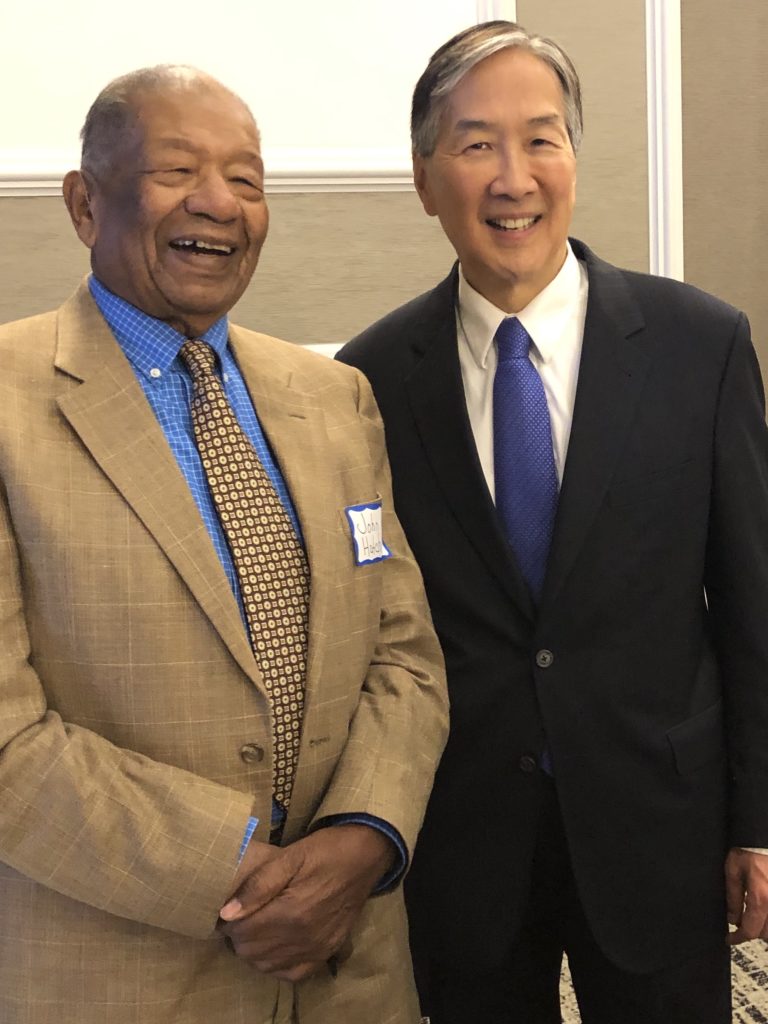Comments at the 4th Annual John W. Hatch FaithHealth Lecture
By Gary Gunderson
This is the fourth time we’ve gathered in the light of Dr. Hatch’s legacy of intellectual and practical professional testimony. A professional is what they profess, and Dr. Hatch urges us to profess the possibility that communities can be decent, surely merciful, even moving toward justice.
Dr. Hatch professes that we need not deny the worst human behavior in order to profess the best. Raised by strong women, men and families who still wept with the deep and bitter wounds of slavery, Dr. Hatch professes the virtues of study, humor, faith and tenacity, all augmented by the rich and simple tools of education for health. He and Greta Thurnburg share the simple message: we can try harder in the face of global catastrophe. We know that because others before us have done in far more bitter circumstances. We can do this now. We are not asked to survive the middle passage and clear the southern swamps. We are merely asked to do the right thing in our day jobs, appreciating how amazing it is that many of us have jobs relevant to these great tasks. We do not face the impossibilities of starting a college for former slaves in the deep south following a bitter war, as did the giants of Shaw University on whose sacred soil we gather.
To profess mercy, justice and humility
We are not asked to face the dogs, ropes and mobs; simply to not turn away from the poor and the ugly complicities that bind them. To tell the truth about their suffering and how it might be alleviated. To tell the truth. To profess mercy, justice and humility. Surely, we can imagine that, at least on this day here with Dr. Hatch (pictured at left) and witnesses including Dr. Howard Koh (at right) and senior public officials who have lived with integrity not unlike Dr. Hatch in the hallways of public power, academic and faith. Professing people.
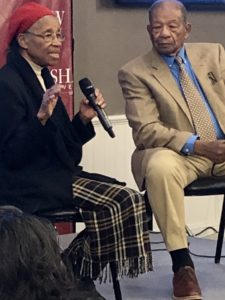 Many of here today focus much of our time on what is possible here in our odd and wonderful little state of North Carolina. Enough to weep over. Enough to hope for. Normally, one would have to hope that the rock-like concrete of unmovable structure could be broken enough for light and a few sprouts to find a way. Instead, we face the opposite; everything is broken and broken open, disconnected, indefensible, fluid, changing. You name the policy, program or promise and it is broken. Seas rise, seasons melt, kids can’t read, dependencies as old as alcohol and as new as the internet confound us. Medicaid was so broken that even the Republicans knew it, is now off the rails in a complicated manner which even the Democrats know. Whether it is diabetes or opioids, we know the answer is not sobriety or another pill, but connection to the things that endure, that heal, that give life. Jesus wept over Jerusalem because the city did not know that. He is weeping today.
Many of here today focus much of our time on what is possible here in our odd and wonderful little state of North Carolina. Enough to weep over. Enough to hope for. Normally, one would have to hope that the rock-like concrete of unmovable structure could be broken enough for light and a few sprouts to find a way. Instead, we face the opposite; everything is broken and broken open, disconnected, indefensible, fluid, changing. You name the policy, program or promise and it is broken. Seas rise, seasons melt, kids can’t read, dependencies as old as alcohol and as new as the internet confound us. Medicaid was so broken that even the Republicans knew it, is now off the rails in a complicated manner which even the Democrats know. Whether it is diabetes or opioids, we know the answer is not sobriety or another pill, but connection to the things that endure, that heal, that give life. Jesus wept over Jerusalem because the city did not know that. He is weeping today.
What is it that we don’t know? What clues might we find here today? I offer that the clue is in the way that health itself has four threads, bio-psycho-social and spiritual. Each is a myriad of mystery of its own, of course. But on its own, none can find any hope at all. We have to go off the map into the place between. We can’t fix Medicaid, Medicare or my ankle until we embrace the seamless interwoven nature of the human phenomenon. It proves almost impossible to break away from our obsession with the biomedical side because of the distortions of money and the inertia of the privileged professions that dare to claim the role of healer. Jesus would flip the tables of the hospital admissions desks over in anger, just as he did the desecrations of the temple merchants.
We have to see clearly, including our own privileges. And then help each other act in ways that are truly healing of the bodily bruises, the long arc of trauma, the social nature of disease and the spiritual bondages that lock it all in place. And then also see the way the body is made for healing the long powerful arc of love of neighbor, the social nature of community, the spirit that loosens every bond, powers every great hope. You can live a whole life that way; Go ask John about his tomatoes and students. You’ll hear it.
Unafraid of the dark
Two weeks ago Teresa Cutts, Jeremy Moseley, Glenn Davis and I drove 1,739 miles up and across the land the First People called 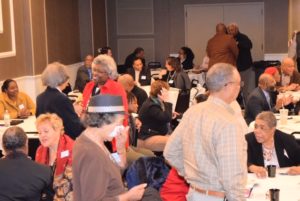 the Inland Sea. We traveled on behalf of dozens of health systems called Stakeholder Health to Huntington, Cleveland, Dayton, Indianapolis, Bloomington, Nashville. We talked with hospital presidents, mayors and security guards, clergy of churches with small and sometimes no steeples at all, cops, EMS and counsellors, community health center leaders, a few ex-cons recovering from their demons and sometimes their dads. Sort of like our room today.
the Inland Sea. We traveled on behalf of dozens of health systems called Stakeholder Health to Huntington, Cleveland, Dayton, Indianapolis, Bloomington, Nashville. We talked with hospital presidents, mayors and security guards, clergy of churches with small and sometimes no steeples at all, cops, EMS and counsellors, community health center leaders, a few ex-cons recovering from their demons and sometimes their dads. Sort of like our room today.
Every town claimed to be the epicenter of this or that catastrophe and a few actually had a good claim on the title (Huntington). In no case was anyone wondering what to do next and what they needed to do it. They might have hoped for the bright noonday sun and a good map. But they were settling for flashlights and fellow-travelers unafraid of the dark. Enough to take the next right steps, enough reason to give away a bit of their private privileges and handful of change to give hope a chance.
We spent a couple hours in the basement of the Real Life Christian Mission Center in a tough part of Huntington with a few dozen pastors, cops and public health folks who had become one in the work of the QRT, the quick response team. The QRT has a simple protocol: within 72 hours of an overdose a team of four people knocks on the door—no matter how scary or fancy the door—and asks if the person who is now not dead, is ready to move on toward healing toward life. The four—cop, EMS, peer and pastor—are one team. Sometimes the pastor, sensing the moment, offers a prayer and it is rarely refused. Sometimes the person does choose treatment, sometimes right away. A pastor told of riding next to a man who nodded in an out of consciousness. It could have been my son on the dark ride to Charleston. How many times would I try, if it was?
You’d think a room like that would be somber and weary, sort like you’d expect Dr. Hatch to be after his life on the Delta and the heavy lift here in the Carolinas where for decade after decade people and communities settle for so far less that science and a generous god makes possible. The Huntington saints helped each other remember what they professed. One pastor told of how the life of the cop kept him from letting his heart get hard. The public health nurse said how the pastors meant so much to the patients and to the team. Like John talking about his tomatoes, the talk was mostly about what they loved, what made them happy, what gave them hope. They laughed a lot. Eight overdoses on that Tuesday; back at it Wednesday.
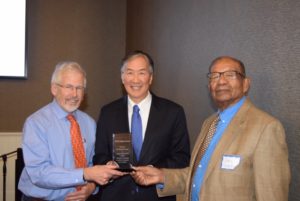 What the common tapestry needs
What the common tapestry needs
Last year we came to the Hatch lecture one stop short of finishing our See2See road trip driving an environmental catastrophe of a Winnebago from San Diego. The Paradise fires burned as we drove, showing on truck-stop TV’s along the way. We ended in Wilmington with the hurricane damage still lining the roads, reducing chaplains to tears at the stories of life-wreckage stacked in the hallways. This year we drove a mini cooper. And the afternoon session focused exactly on the climate and the profound health, disparities and justice dynamics both driving and resulting from it. If we fail at this, no other public health accomplishment will survive even one more generation. We’re very grateful to have Ben Money and Secretary Regan with us as this administration deserves our thanks for taking leadership in this area.
I am old enough to know that the people who find their life in giving themselves to the hopes of the people God so loves find their joy and sustenance in the others drawn to that work of life. This work of FaithHealth is so complex and expansive, so immediate and profound. We are not given a blueprint or computer program that tells us the full scope of our work. Rather, I think we are given a way to be smart enough and brave enough to do the next right things and do them well together. The thread of our own lives, broken and mended more than a few times turns out to be just what the common tapestry needs to make sense, just strong enough together to be worth throwing to a drowning friend.
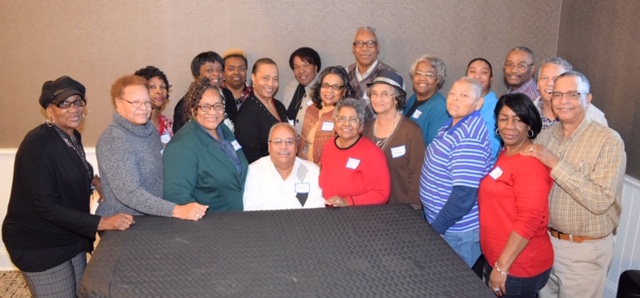 We are here not to weave separate threads into a rope strong enough to hold the weight of unprecedented hopes. We are weaving threads of faith, democracy, health science and love of the population called public, the world that God so loves. It turns out that these are not different kinds of threads, as if from bone, wire, cotton and catgut. Our task is far more natural, to weave with threads intended for exactly this purpose, drawn from separate spindles at most, lacking only the shuttle and the loom to weave the fabric we might call worthy of this time.
We are here not to weave separate threads into a rope strong enough to hold the weight of unprecedented hopes. We are weaving threads of faith, democracy, health science and love of the population called public, the world that God so loves. It turns out that these are not different kinds of threads, as if from bone, wire, cotton and catgut. Our task is far more natural, to weave with threads intended for exactly this purpose, drawn from separate spindles at most, lacking only the shuttle and the loom to weave the fabric we might call worthy of this time.
You could argue that some of these threads are broken, others flawed. The thread of faith sometimes seems to have lost its tether to the great Spirit of healing, satisfied with comforting the sorrows when it has the power of transformation. Health often losses its tether to sacrifice and generosity, satisfying itself with a slimy and unsavory mess of financial porridge, when it could have been an instrument of grace and mercy. And the public offices, what can we say about the thread of common labor of free people in our time without words, data, facts or honor?
These are hard-hearted and hard-headed days. Anyone who is not sick at heart, must be sick. What a gift to be together with people who have not given up or held back their very best. We are here gathered in the light of Dr. Hatch to remember our common profession, woven of threads far better together than apart. Where else would you rather be?
